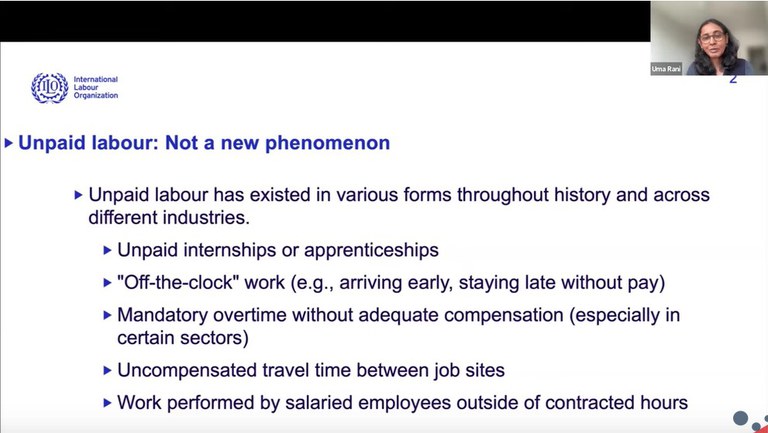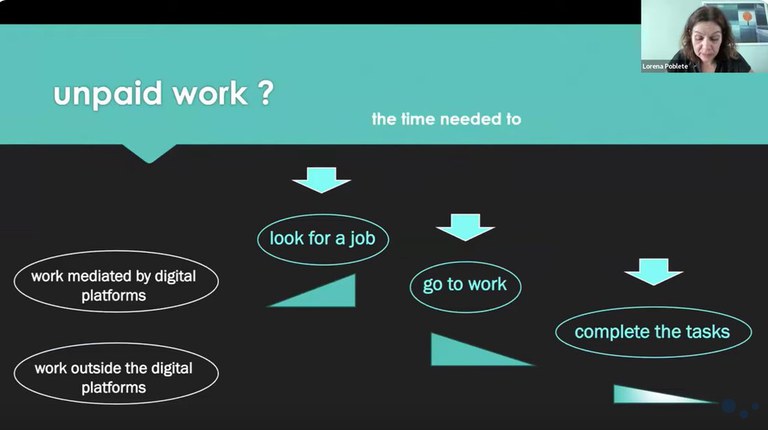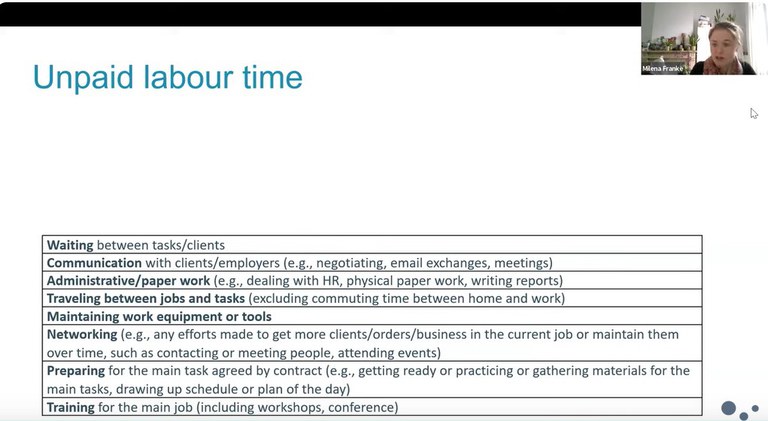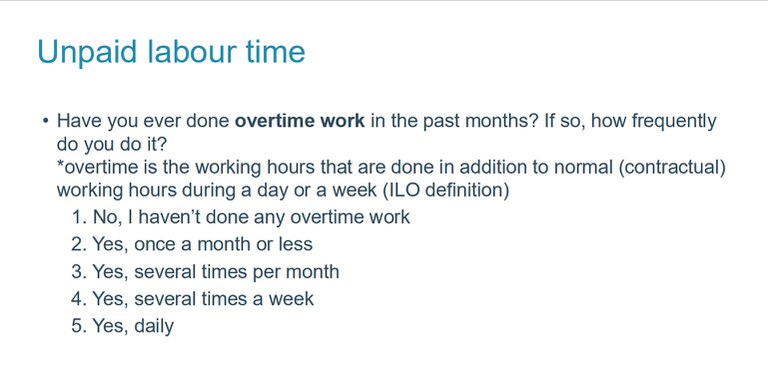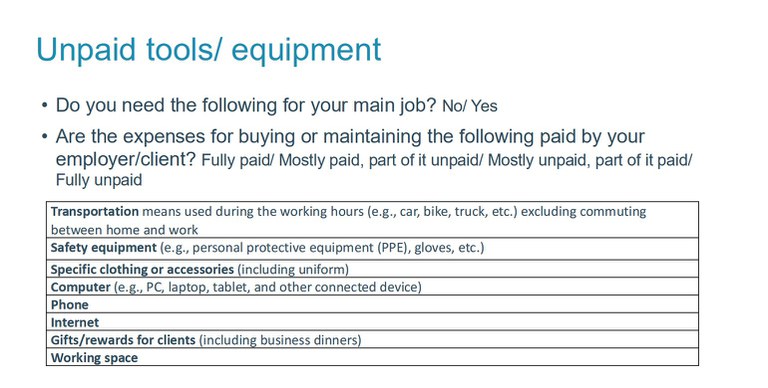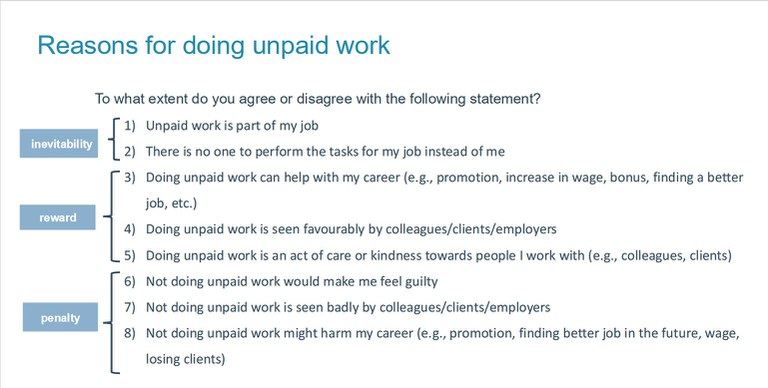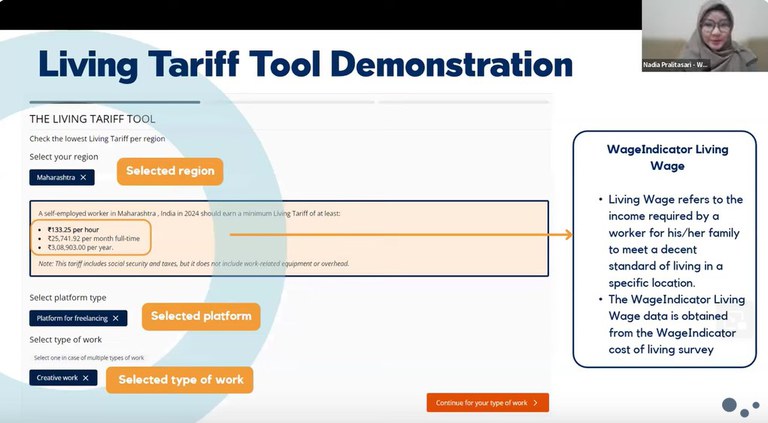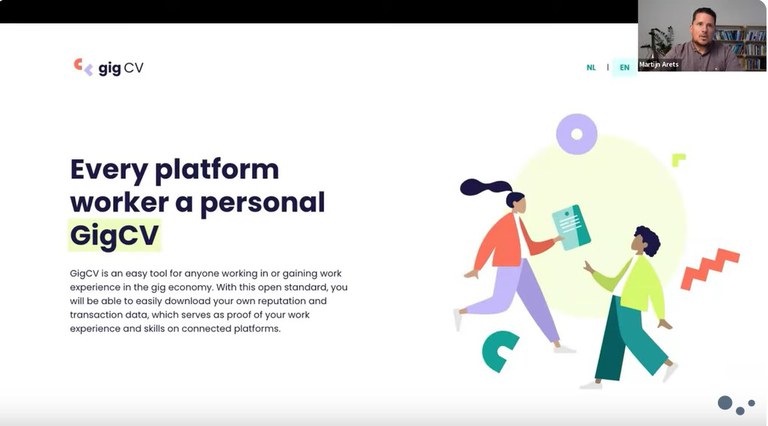Many, if not the majority, of platform workers regularly find themselves doing unpaid work. The most common types of unpaid work faced by unprotected platform workers, freelancers, and other self-employed individuals include preparing for gigs, commuting to job sites, purchasing necessary tools and materials, handling administrative duties, upgrading skills through training, keeping up with market demands, and self-promotion.
For platform workers, these unpaid tasks are not just a financial burden; the impact is also social, and the 'always-on' mentality encouraged by platform algorithms invades personal time, straining relationships with friends and family.
To address this context, but also to offer a glimmer of hope through practical good practices, WageIndicator has hosted the webinar 'No Such Thing as a Free Coffee: On Unpaid Work in the Gig Economy and Possible Solutions.'
The Normalisation Of Unpaid Work
“The issue of unpaid work has not suddenly arisen because of the gig economy; it has always been there," said WageIndicator Director Fiona Dragstra, opening the event. "What we are seeing is that there are many more risks and costs associated with gig work."
This was also a point of emphasis for Uma Rani in her keynote speech.
Uma Rani, Senior Economist in the Research Department of the International Labour Office, ILO, highlighted that "unpaid work is a real part of the traditional labour market for a number of precarious workers or employees," Not to mention the unpaid domestic and care work that traditionally falls to women.
However, "the dynamics of the platforms limit the ability of workers to translate their efforts into fair remuneration," and "the competition fuelled by the platforms actually leads to an oversupply of labour".
A 'normalisation of unpaid work' takes place on platforms: "Workers, especially freelancers, strive for visibility and positive ratings because these are essential elements for accessing work on these platforms," and in doing so, "they feel pressured to compete for tasks that may not translate into income, or to offer lower rates to secure projects”.
Some eloquent figures illustrate these challenges: according to ILO research, while traditional self-employed workers are able to price in unpaid work, platform workers in the global online labour market spend an average of 8 hours a week on unpaid work, and total hourly earnings fall by a third for every minute of unpaid time. This leads to a polarisation of earnings between those in platform work and those in traditional work. "And for workers in developing countries, this is much more disadvantageous because they do a lot of unpaid work," Uma Rani added.
“I think it would be very important in the future to recognise and value unpaid work. Both traditional and online or platform labour markets need stronger labour protections, but also a shift in societal norms about how we value work and how we want to compensate all of the different types of work”.
And Uma Rani concluded, "The debate is needed now more than ever. With the future of work and the digital economy, where a lot of re-skilling is required, there's a big debate now about who's going to pay for the costs of re-qualification, whether it's the employer or whether it's the employee or whether it's shared”.
Watch the recording of the keynote (minutes 7:50-24:00) to see how platforms are incorporating unpaid work into their business models, or dive into Uma Rani's presentation for an in-depth exploration of the issue.
Hidden Hours: The Unpaid Labour Behind Domestic Work Platforms
In the panel discussion, moderated by Valeria Pulignano, Professor of Sociology at KU Leuven, a focus on domestic work was then introduced by labour expert Lorena Poblete, Universidad Nacional de San Martín, Buenos Aires, and researcher at the National Scientific and Technical Research Council (CONICET).
Alongside two colleagues, Ania Tizziani and Francisca Pereyra, she initiated a project focused on labour platforms, with a particular emphasis on domestic work platforms in Argentina. Their research delved deeply into Zolvers, Argentina's leading platform for domestic work. (To find out more, read the blog “El lado B del trabajo doméstico” on Gigpedia)
"All the domestic workers interviewed have both platform and off-platform work, and sometimes the platform work later becomes a regular job.” Lorena Poblete explained to provide context. "In addition, due to inflation, many workers use the service as a one-off jump to increase their income."
The issue of unpaid work usually arises when they are looking for news gigs or when clients ask them to stay overtime: “They are constantly looking for new jobs, whether regular or one-off. When we look at the time it takes to look for a new job, we see that platforms tend to increase this type of unpaid work more than traditional domestic work. This means devoting an hour or more a day to it. Also, because they are afraid of losing their jobs or getting low ranking, they tend to stay longer without getting paid. It is very common to receive a phone call from the employer in the 5 or 10 minutes before the end of the working day, asking you to do something else”.
For more insights, watch the recording of Lorena Poblete's contribution (minutes 29:00-35:50), and view Lorena's presentation on unpaid work in domestic work.
The multidimensional concept of unpaid work
To enrich the discussion with qualitative data on unpaid work in the gig economy, Milena Franke, a postdoctoral researcher at KU Leuven, was also invited to participate in the webinar as a panel member. She presented the findings of a survey developed within the ResPecTMe project to develop a novel theoretical perspective on precarity and measurement of unpaid work on different platforms and across different sectors (care, creative, and platform work) in eight countries. The generation of quantitative data is currently underway.
Although the concept of unpaid work is multidimensional, and it was not straightforward to devise a concise set of survey questions for workers with sector-specific experience, it is possible to analyse this phenomenon in terms of time. “We asked workers whether this time was paid for by their employer or by their client. And that was one way of asking about these different types of unpaid work in our survey module. And then there was another dimension that we also see as unpaid work, which is basically asking about overtime, which is actually a form of unpaid work.
The other dimension relates to work-related costs and the tools that workers have to pay for themselves. "We looked at safety equipment, special clothing or accessories, computers, telephones, and internet, and asked whether they used the following things in their work and whether the costs of buying or maintaining these materials were covered”.
It was then particularly interesting to explore the reasons why workers accept unpaid work. In some cases, unpaid work seems to be a necessity in order to have a career; in others, it is due to the lack of people who can do some work in their place; and then there is a remarkable sense of guilt that pushes workers to work even if they are not paid, otherwise they might be undervalued by the system, by colleagues or by themselves.
In her closing remarks, Milena Franke agreed with Uma Rani: when it comes to unpaid work, sharing is caring. The more we talk about it, the better. “Unpaid work is a complex issue that needs to be explored in more depth. Policymakers and researchers in general can help make these issues much more visible.”
Find out more about the ResPecTMe project by watching the recording of Milena Franke's contribution (minutes 36:00-43:00) and viewing Milena's presentation.
More publications on unpaid labour in the platform economy produced within the ResPecTMe project here, here, and here
A Glimmer of Hope: The Good Practice Examples
As Fiona Dragstra pointed out in her welcome address, this webinar was also designed to provide some practical solutions.
They came in the form of two projects presented in the good practice session: the Living Tariff tool and the GigCv tool.
How can freelancers and gig workers be properly paid? is the big question that the Living Tariff tool aims to answer. Gajimu's labour expert Nadia Pralitasari presented a practical guide on how it works.
Based on the Living Wage model developed by WageIndicator, it takes into account all costs associated with freelance and gig work (waiting time, training, taxes, social security) and recognises that each worker's situation is different and unique. Therefore, each component is customisable to make the Living Tariff tool suitable for all types of workers and to provide more personalised calculations.
The Living Tariff tool has been launched in five countries so far, but what is the response? "Gig workers appreciate the ease of calculating a fair rate for their services, especially for a newcomer to freelancing." Nadia pointed out. "However, while some gig workers have a clearer idea of what their rate should be, there are still many workers who struggle to negotiate the rate with the platform they work for, especially in the ride-hailing and delivery services."
Nadia reported on some efforts in Indonesia: "The Living Wage could also make gig workers more aware of their rights and hopefully encourage them to join a union for stronger collective bargaining power. For example, the ride-hailing communities have started to use it as a reference point to negotiate with the government to cap fares”.
What's next? "We plan to work with freelance platform companies to provide a salary guide for their platform workers to help freelancers set fair prices."
International thinker and expert on the gig economy Martijn Arets then presented his project on data portability: GigCV is a tool that aims to provide every platform worker with a free personal CV.
When analysing the issue of unpaid work in the gig economy, pay is only one aspect: then comes data: "Access to data about reputation and work done on the platform is valuable for workers to get more work and, in some cases, better (or less bad) pay."
The platforms know this very well: "These systems are designed so that you can't take the data with you to other platforms. So within the platform, it works really well for you, but it's only within the platform". This is where projects like GigCV come in.
Thanks to GigCv, workers can download a free PDF document containing their own reputation and data transactions. At this stage, 100,000 workers can download their CVs, and 35,000 CVs have already been downloaded. Some platforms have already implemented the API, and the tool has been launched in seven countries".
But what kind of data do workers want to take with them? "According to some questionnaires we've shared with workers, it's mainly written reports, ratings. and the number of gigs completed".
But isn't it difficult to share workers' data in a landscape of strict data protection laws? Martijn Arets is certain: "Not at all. Sharing data via APIs is not rocket science; it’s at the core of every platform company, so if you want to make it difficult, you can, but it’s not. Keeping data to yourself is an act of weakness; on the contrary, platforms should see how data sharing is contributing to their value proposition".
And back to the point of the webinar, he concluded: "Data created by workers is also unpaid work. You can compensate workers by sharing it with them".
And what about regulation? "I expect regulation to move from on-demand (think GDPR in Europe) to real-time data sharing (Digital Markets Act)."
Watch the video of our Good Practice Session (minutes 1:10:00-1:28:00) and view Martijn's presentation here and Nadia’s presentation here
Learn more about the Living Tariff in our blog Towards a Living Tariff: Even freelancers deserve a fair income or test the Living Tariff Tool yourself
|
About Good Practices During the webinar, Fiona Dragstra was quick to mention the work that WageIndicator and Nippy have done to benefit workers in the Latin American region. “WageIndicator and Nippy have partnered to start analysing datapoints from 15,000 unique workers from a unique Nippy database containing information on platform workers working on over 18 platforms across the Latin American region. Our joint goal is to provide greater insight into workers' earnings and behaviour. Nearly 20% currently earn less than they would expect based on living wage estimates. We intend to compare this data with our Living Tariff and expect the gap to be even much wider, as it's a much higher estimate of a decent income than the Living Wage.” The data analysis is still ongoing. For more information, feel free to reach out to us. |
Q&A
The discussion between the speakers and the participants was particularly lively and revolved around questions such as (1) can employment solve unpaid work issues, and (2) what are trade unions doing to address unpaid work in the platform economy? See more insights below.
|
Q: Do you think we should move towards a system where all workers are recognised as employees, or should we continue to push for the representation of gig workers as they are? And what would be the role of trade unions in this scenario?
Q: What are the real benefits of unions for workers in the gig economy? Martijn Arets: It depends on the union and also on the type of gig work. But in the end, platforms operate in highly fragmented markets (supply and demand) and increase information asymmetry. Then the only way to create a counter-power is through organising. This is what trade unions (should) do. Valeria Pulignano: In Italy we have an example of a joint effort between traditional unions and the rank and file. Here is the link to the paper. Another report on workers' solidarity in platform work here. Participant 1: It's a real challenge for unions. Gig work isn't long term and creating a community and developing common interests to defend and negotiate for is a challenge...building a collective is key for gig workers as it is for all workers...what the platform economy highlights is the loss of collective action and organisation for different kinds of workers...short term contracts for ex and self-employed bogus or others...there's still room for improvement there. Participant 2: I completely agree that building a collective identity among gig workers is a big challenge, especially with the short-term nature of contracts in the gig economy.
Q: What about the data that gig workers collect about clients/customers that is then used by platforms? Participant 1: If this is of interest, we set up the Workers' Observatory in Edinburgh a few years ago. We're currently researching how migrant delivery drivers perceive the platforms' use of AI-driven and algorithmically managed systems, and what workers can do to counter this, including developing their own AI-driven tools. We're facing a lot of issues around data and lack of transparency from the platforms. Martijn Arets: I think it depends on the type of work. If you want to build a customer base, then the worker should have access to that data. |
Ten Final Takeaways on Unpaid Work
- Unpaid work has long existed in traditional labor markets but has now become embedded in platform work.
- Unpaid work polarises income inequality between traditional and platform labour markets, especially in developing countries.
- Unpaid work is a significant factor when discussing gig economy issues, and its impact varies across different economic sectors.
- Unpaid work needs to be made visible, as discussing unpaid work in terms of costs often proves challenging.
- Unpaid work is linked to an important ongoing debate about who should bear the costs of up-skilling and re-skilling in the digital economy.
- Unpaid work in the domestic sector is largely the result of overtime work on the part of workers to satisfy customers
- Unpaid work has several dimensions: the first is (over)time, and then the tools that workers need to buy themselves
- Unpaid work has a huge social impact on the blurred boundaries between workers and their families. This is especially true for women.
- Unpaid work can be tackled with practical solutions such as the Living Tariff tool, which makes it easier for them to calculate and negotiate fair pay by taking into account variables like waiting time.
- Unpaid work is linked to worker-generated data. Data created by workers on platforms is also unpaid work, as they should be able to use it to get new jobs and better pay. Platforms should compensate workers by sharing data with them.
| Mark your calendars! On 28 March 2025, The Ghost Workers: Do You Know Who’s Behind your AI?, WageIndicator’s next gig webinar, will tackle a major topic: the impact of artificial intelligence on work and workers. Stay tuned for more. |

